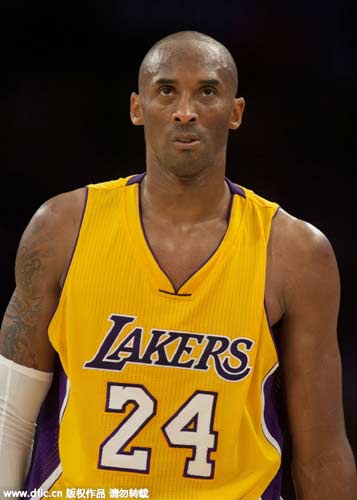

 |
|
Kobe Bryant of the Los Angeles Lakers during their NBA game against the Phoenix Suns at the Staples Center in Los Angeles, California, Nov 4, 2014. [Photo/IC] |
The NBA star told Xinhua that he was learning Chinese to understand comments left by customers at his new Taobao store Kobe Inc on Alibaba.
Bryant is just one of many overseas celebrities starting online businesses in China. Alibaba, the world's biggest shopping portal, has recruited some 100,000 celebrities to promote products for some of its 10 million vendors across its two main sites, Taobao and TMall.
Calling his Taobao store "only a beginning," Bryant has plans for another store on TMALL. In the video, Bryant explains he intends not just to see his branded products, but to share his philosophy and stories to inspire people and make the world a better place.
"There are so many people starting e-commerce businesses and the competition is intense," he said. "My team and I look at our sales figures every day, and so far, I can tell you, doing business in China is much easier than learning Chinese!"
In 2014, when Bryant was drawing up his business plan, he identified China as one place where he wanted to do well. He describes partnership between Kobe Inc. and Alibaba as a new and exciting chapter that will bring him closer to his millions of Chinese fans.
It's a jungle out there
In June, Alibaba predicted that by 2020, China would be doing more business-to-customer deals than any other country.
Over the past year, American products have become much more widely available to Chinese competitors. Macy's, Costco, Apple and Pfizer Pharmaceuticals have set up shops with China's domestic e-commerce experts.
Amazon, one of online retail's genuine heavyweights, opened a store on TMall in March. At the time, the two were seen as rivals. Questions were asked about how and whether they planned to cooperate. Once upon a time, Amazon.cn dealt almost exclusively in books, but the business has diversified and now offers over 1,000 of other products, including footwear, beverages, kitchenware and toys. The latest development saw Amazon offer fresh America farm produce online.
Niu Yinghua, vice president of Amazon China, expects the TMall store to increase sales of international products.
"American companies are usually very specialized. They see the potential of the Chinese market but look to partners like Alibaba for local knowledge and expertise. Even competitors can learn from one another and profit together," said Wu Qian.
According to Wu, one of Alibaba's priorities is to help small and medium-sized US companies exploit the Chinese market.
Cross-border e-commerce epitomizes the enormous potential of Sino-US cooperation. Jack Ma, founder of Alibaba, and now one of China's richest men, knows what it takes for foreign small and medium-sized companies to tap China's potential.
"What Alibaba wants to do is to connect small players from the West with the giant market in the East," he said.
Peace is good for business
Talking to the Wall Street Journal recently, President Xi Jinping extolled the virtues of Sino-US cooperation, describing their commercial interests as "closely connected." Better Sino-US relations, Xi said, are not only good for the people of both countries, but are good for regional and global peace and stability.